 W
WThe 2005 Al-Anbar CH-53E crash refers to an aviation accident which occurred on January 26, 2005 when a United States Marine Corps CH-53E Super Stallion helicopter crashed while ferrying U.S. military personnel in the Al-Anbar province of western Iraq, near the town of Ar-Rutbah. All thirty-one troops aboard the helicopter died in the crash which made it the deadliest single incident for U.S. troops during the Iraq War. The accident took place while coalition forces were trying to secure the country ahead of the January 2005 Iraqi parliamentary election slated to take place later that month. The cause of the crash was determined to be the pilots becoming disoriented when they flew into a sandstorm
 W
WThe Anbar campaign consisted of fighting between the United States military, together with Iraqi Government forces, and Sunni insurgents in the western Iraqi governorate of Al Anbar. The Iraq War lasted from 2003 to 2011, but the majority of the fighting and counterinsurgency campaign in Anbar took place between April 2004 and September 2007. Although the fighting initially featured heavy urban warfare primarily between insurgents and U.S. Marines, insurgents in later years focused on ambushing the American and Iraqi security forces with improvised explosive devices (IED's), large scale attacks on combat outposts, and car bombings. Almost 9,000 Iraqis and 1,335 Americans were killed in the campaign, many in the Euphrates River Valley and the Sunni Triangle around the cities of Fallujah and Ramadi.
 W
WAl-Sadr Online was the official website of the High Board for Media of Al-Sadr's Office. The High Board is the media organization of Muqtada Al-Sadr, a Shia Muslim Iraqi religious and political leader. The site, which commenced operation in 2007, performs several functions in support of Sadrist objectives. The site's distinct format includes a section in which Al-Sadr offers religious opinions in response to queries from site followers. Al-Sadr Online publishes news about Sadrist political, social, and religious activities in southern Iraq and the Arab world. In addition, the Board's staff also posts commentary on issues pertaining to Iraqi and pan-Arab politics as well as some international news. The site posts numerous links to pages of organizations sympathetic to the Sadrist Movement, many of which are based in Iran and Lebanon. Al-Sadr Online posts most of its content in Arabic, though it does maintain a less robust English page.
 W
WThe Baghdad Airport Road is a 12-kilometre (7.5 mi) stretch of highway in Baghdad, Iraq linking the Green Zone, a heavily fortified area at the centre of Baghdad, to Baghdad International Airport (BIAP). It also links different parts of Baghdad to the Airport and connects neighbouring areas to each other. It became prominent after the 2003 invasion of Iraq following its capture by the Coalition Forces. Although it was commonly referred to by the military Main Supply Route (MSR) designation Route Irish, the route from the International Zone to the airport stretches over two MSRs: Route Aeros, the section leading into and out of the International Zone, and Route Irish, which stretches east from the airport, then turns south to a junction with Highway 1.
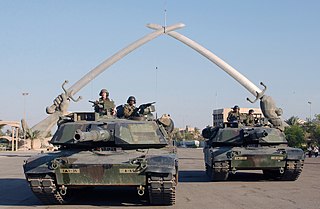 W
WThis is a list of coalition military operations of the Iraq War. The list covers operations from 2003 until December 2011. For later operations, see American-led intervention in Iraq (2014–present).
 W
WCombat Outpost San Juan also called COP San Juan was a United States Army installation in the southwestern region of Baghdad, Iraq during the Iraq War. Located in a rural area approximately 4 kilometers southwest of Baghdad International Airport, it served as a tactical operations center primarily for the 4th Battalion, 27th Field Artillery Regiment, Bravo Battery and the 1st Battalion, 77th Armored Regiment from 2005 until its destruction in 2007.
 W
WThe combatants of the Iraq War include the Multinational Force in Iraq and armed Iraqi insurgent groups. Below is a list of armed groups or combatants that participated in the Iraq War of 2003-2011.
 W
WThe fragging deaths of Phillip Esposito and Louis Allen occurred on June 7, 2005, at Forward Operating Base Danger in Tikrit, Iraq. Captain Phillip Esposito and First Lieutenant Louis Allen, from a New York Army National Guard unit of the United States 42nd Infantry Division, were mortally wounded in Esposito's office by a Claymore mine and died.
 W
WThe United States bombardment of Fallujah began in April 2003, one month after the beginning of the invasion of Iraq. In April 2003 United States forces fired on a group of demonstrators who were protesting against the US presence. US forces alleged they were fired at first, but Human Rights Watch, who visited the site of the protests, concluded that physical evidence did not corroborate US allegations and confirmed the residents' accusations that the US forces fired indiscriminately at the crowd with no provocation. 17 people were killed and 70 were wounded. In a later incident, US soldiers fired on protesters again; Fallujah's mayor, Taha Bedaiwi al-Alwani, said that two people were killed and 14 wounded. Iraqi insurgents were able to claim the city a year later, before they were ousted by a siege and two assaults by US forces. These events caused widespread destruction and a humanitarian crisis in the city and surrounding areas. As of 2004, the city was largely ruined, with 60% of buildings damaged or destroyed, and the population at 30%–50% of pre-war levels.
 W
WThe Fallujah killings of April 2003 began when United States Army soldiers from the American 1st Battalion, 325th Infantry Regiment of the 82nd Airborne Division fired into a crowd of Iraqi civilians who were protesting their presence at a school within the city of Fallujah by throwing rocks and firing weapons. The soldiers claimed they were receiving fire from the crowd, whereas the civilians said they were shot at first. Human Rights Watch, which inspected the area after the incident, found no physical evidence of shots fired at the building where U.S. forces were based. However, the New York Times reporting on the incident confirmed the soldier's reports of fire on their position by observing bullet marks the next day. Neighbors also confirmed there were armed protestors firing, though they claimed they were only firing in the air.
 W
WFort Suse is an Iraqi military installation located in the Kurdistan region of Iraq in the vicinity of Al-Sulamaniya. It was built in 1977 by Russian engineers as a barracks and training facility, but now serves as a prison.
 W
WThe Good Soldiers (2009) is a non-fiction book about the 2007 troop surge in Iraq written by David Finkel, chronicling the deployment of 2nd Battalion, 16th Infantry Regiment of the 4th Infantry Brigade Combat Team, 1st Infantry Division, nicknamed "Rangers", under the command of Lieutenant Colonel Ralph Kauzlarich. The story follows Kauzlarich as he experiences the reality of war, and loses soldiers for the first time.
 W
WThe Green Zone is the most common name for the International Zone of Baghdad. It was a 10-square-kilometer (3.9 sq mi) area in the Karkh district of central Baghdad, Iraq, that was the governmental center of the Coalition Provisional Authority during the occupation of Iraq after the American-led 2003 invasion and remains the center of the international presence in the city. Its official name beginning under the Iraqi Interim Government was the International Zone, though Green Zone remains the most commonly used term. The contrasting Red Zone refers to parts of Baghdad immediately outside the perimeter, but was also loosely applied to all unsecured areas outside the off-site military posts. Both terms originated as military designations.
 W
WThe Haditha massacre was a series of killings on November 19, 2005, in which a group of United States Marines killed 24 unarmed Iraqi civilians. The killings occurred in Haditha, a city in Iraq's western province of Al Anbar. Among the dead were men, women, elderly people and children as young as 1, who were shot multiple times at close range while unarmed. It was alleged that the killings were a response to the attack on a convoy of Marines with an improvised explosive device that killed Lance Corporal Miguel Terrazas.
 W
WThe Occupation of Iraq is characterized by a large United States military deployment on Iraqi territory, beginning with the U.S.-led invasion of the country in March 2003 which overthrew the Ba'ath Party government of Saddam Hussein and ending with the departure of US troops from the country in 2011. Troops for the invasion came primarily from the United States, the United Kingdom and Poland, but 29 other nations also provided some troops, and there were varying levels of assistance from Japan and other countries.
 W
WThe Iraqi Civil War was a civil war between the Iraqi government allied with the American-led coalition and various sectarian armed groups from 2006 until 2008. Following the 2003 invasion of Iraq, intercommunal violence between Iraqi Sunni and Shia factions became prevalent. In February 2006, the Sunni organization Al-Qaeda in Iraq bombed the Al-Askari Shrine in Samarra which is considered one of the holiest sites in Shia Islam. This set off a wave of Shia reprisals against Sunnis followed by Sunni counterattacks.
 W
WThe Iraq Freedom Congress is a libertarian socialist, progressive, democratic, and secularist group. The Congress was formed in March 2005 by labor groups, women's groups, students, and neighborhood groups concerned about sectarian violence, Ba'athism, Islamism, and nationalism, as well as the post-war occupation.
 W
WThe Iraq Study Group Report: The Way Forward – A New Approach is the report of the Iraq Study Group, as mandated by the United States Congress. It is an assessment of the state of the war in Iraq as of December 6, 2006, when the ISG released the report to the public on the Internet and as a published book. The report was seen as crucial by Bush, who declared: "And truth of the matter is, a lot of reports in Washington are never read by anybody. To show you how important this one is, I read it, and [Tony Blair] read it."
 W
WThe Iraq War was a protracted armed conflict from 2003 to 2011 that began with the invasion of Iraq by the United States–led coalition which overthrew the authoritarian government of Saddam Hussein. The conflict continued for much of the next decade as an insurgency emerged to oppose the coalition forces and the post-invasion Iraqi government. An estimated 151,000 to 1,033,000 Iraqis died in the first three to five years of conflict. US troops were officially withdrawn in 2011. The United States became re-involved in 2014 at the head of a new coalition; the insurgency and many dimensions of the armed conflict continue. The invasion occurred as part of the George W. Bush administration's War on Terror following the September 11 attacks despite no connection of the latter to Iraq.
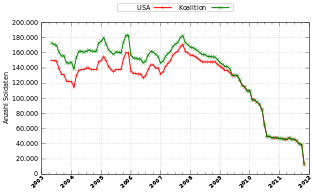 W
WIn the context of the Iraq War, the surge refers to United States President George W. Bush's 2007 increase in the number of American troops in order to provide security to Baghdad and Al Anbar Governorate.
 W
WThe lead-up to the Iraq War began with United Nations Security Council Resolution 687 and subsequent UN weapons inspectors inside Iraq. This period also saw low-level hostilities between Iraq and the United States-led coalition from 1991–2003.
 W
WThe Mahmudiyah rape and killings were war crimes involving the gang-rape and murder of 14-year-old Iraqi child Abeer Qassim Hamza al-Janabi and the murder of her family by United States Army soldiers on March 12, 2006. It occurred in the family's house to the southwest of Yusufiyah, a village to the west of the town of Al-Mahmudiyah, Iraq. Other members of al-Janabi's family murdered by Americans included her 34-year-old mother Fakhriyah Taha Muhasen, 45-year-old father Qassim Hamza Raheem, and 6-year-old sister Hadeel Qassim Hamza Al-Janabi. The two remaining survivors of the family, 9-year-old brother Ahmed and 11-year-old brother Mohammed, were at school during the massacre and orphaned by the event.
 W
WThe Multi-National Force – Iraq (MNF–I), often referred to as the coalition forces, was a military command during the 2003 invasion of Iraq and much of the ensuing Iraq War, led by the United States of America, United Kingdom, Australia, Spain and Poland, responsible for conducting and handling military operations.
 W
WThe Nisour Square massacre occurred on September 16, 2007, when employees of Blackwater Security Consulting, a private military company contracted by the US government to provide security services in Iraq, shot at Iraqi civilians, killing 17 and injuring 20 in Nisour Square, Baghdad, while escorting a U.S. embassy convoy. The killings outraged Iraqis and strained relations between Iraq and the United States. In 2014, four Blackwater employees were tried and convicted in U.S. federal court; one of murder, and the other three of manslaughter and firearms charges; all four convicted were pardoned by Donald Trump in December 2020.
 W
WThe Pentagon military analyst program was a propaganda campaign of the U.S. Department of Defense (DoD) that was launched in early 2002 by then-Assistant Secretary of Defense for Public Affairs Victoria Clarke. The goal of the operation is "to spread the administrations's talking points on Iraq by briefing retired commanders for network and cable television appearances," where they have been presented as independent analysts; A Pentagon spokesman said the Pentagon's intent is to keep the American people informed about the so-called War on Terrorism by providing prominent military analysts with factual information and frequent, direct access to key military officials. The Times article suggests that the analysts had undisclosed financial conflicts of interest and were given special access as a reward for promoting the administration's point of view. On 28 April 2008, the Pentagon ended the operation. A DoD Inspector General investigation found no wrongdoing on the part of the DoD.
 W
WThe Private Security Company Association of Iraq (PSCAI) was a not-for-profit organization formed and maintained to discuss and address matters of mutual interest and concern to the industry conducting private security functions in Iraq. The PSCAI worked closely with the Iraqi Government, Coalition Provisional Authority and Coalition forces to promote transparency, legitimacy, and accountability for the private security company industry. The PSCAI was dissolved on December 31, 2011.
 W
WRamadi, the capital of Iraq's Al Anbar Governorate, was under U.S. military occupation during the Iraq War. It was a focal point of Iraqi insurgency, which erupted into open armed conflict in 2004 and in 2006, part of the Iraq War in Anbar Province. Operation Murfreesboro was a U.S. offensive in February 2007 intended to cut off the Ma'Laab district of eastern Ramadi from the rest of the town in order to drive out Zarqawi's Al-Qaeda in Iraq.
 W
WThe Report to Congress on the Situation in Iraq was a two-part report released on September 10, 2007 by General of the Multinational force in Iraq David H. Petraeus and U.S. Ambassador to Iraq Ryan Crocker on progress by the Iraqi government in the ongoing Iraq War.
 W
WA Responsible Plan to End the War in Iraq is a 36-page plan that was created by a group of United States Democratic congressional candidates, retired military officers and national security professionals that outlined policy measures that the candidates pledged to support in the 2008 elections.
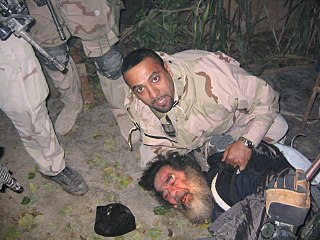 W
WTask Force 121 was a United States Department of Defense special operations task force. TF121 was a multi-service force from Joint Special Operations Command, made up of operators from the U.S. Army's Delta Force, 75th Ranger Regiment, and 160th Special Operations Aviation Regiment, the U.S. Navy's SEAL Team Six, the CIA's Special Activities Division, U.S. Air Force Combat Controllers, Pararescuemen, Tactical Air Control Party operators, and Special Operations Weather Technicians, the Aviation Tactics Evaluation Group (AvTEG), and the Joint Communications Unit. Two companies of armor from the U.S. Army 4th Infantry Division provided armor support.
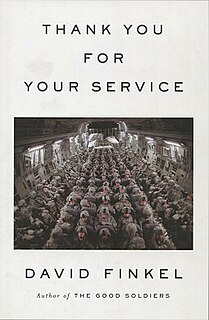 W
WThank You for Your Service, written by the American journalist David Finkel, is the follow up non-fiction book to The Good Soldiers, which chronicles the lives of the 2-16 Infantry Battalion in Baghdad during 2007 and 2008. With this sequel, Finkel examines the soldiers' lives back home in the US as they struggle to readjust to family and civilian life. The book was published in 2013 by Farrar, Straus and Giroux and was a finalist for the National Book Critics Circle Award.
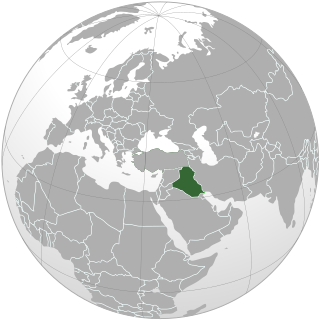 W
WUnited Nations Security Council Resolution 1905, adopted unanimously on December 21, 2009, after noting the letter from Prime Minister of Iraq Nouri al-Maliki, the Council extended until 31 December 2010 the arrangements for depositing proceeds from oil and gas export sales into the Development Fund for Iraq, established under Resolution 1483 (2003).